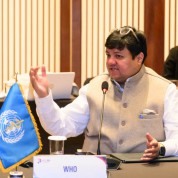With the rise of artificial intelligence and continued investments in technologies, the future of global health will be intertwined with the responsible advancement of digital health in all of its aspects. This will require global health governance to, among other areas, drive the imperatives for the governance of health data that allows for cross-border collaboration; the involvement of the public and providers in the development, deployment, and evolution of digital health technologies; and the advancement of responsible AI that is equitable for all, environmentally sustainable, and scalable across facilities, regions, and borders.
When advanced collectively, this will require global health governance to drive actions that enable compatible policies across borders for enabling health data use and scaling of digital tools; standards for data and technology that are harmonised to improve data quality and timeliness as well as safety in the deployment of digital innovations; incentives to scale and be scale that in turn would realise exponential creation of value; and a culture that respects and fosters trust with sufficient workforce capacity to develop, implement, use, regulate, and evolve innovations.
To that end, global governance for health – in the context of digitalisation, health data, and artificial intelligence – needs to establish, oversee, and evolve the ‘space’ between the generation of digital innovations and their consumption. This space would be non-competitive and compatible in policies and standards to foster innovation; listen to consumers to understand and embed their requirements for innovations including safety and protection; and be agile to respond to changes in the operating environment – with new capabilities, dangers, and opportunities. The analogy for this space is similar to that for electricity – where new sources are identified and improved in generation and demands from consumers change continuously. In that context, the IEEE (Institute for Electric and Electrical Engineers) helps that function of establishing, overseeing, and evolving the ‘space’ between generation and consumption in ways that have generated significant value for humanity.
The question that this workstream will seek to answer is “what does Global Governance of Digital Health look like while taking lessons from our experiences with electricity and other global public goods”.
The overarching objective of this session is to examine the fragmentation of the global regulatory ecosystem for AI in health and enhance global cooperation by promoting alignment on implementation strategies at the national and regional levels.
Key issues: Lack of common standards, benchmarks, and implementation interoperability within and between jurisdictions
SPEAKERS
Biosketch
Alain Labrique
Batoul Albaz
Chaitali Sinha
Deepika Mishra
Gopal Ramchurn
Laura Reichenbach
Nancy Pignataro
Purvi Shah
Sameer Pujari
Simao Campos
Yasuhiro Fujiwara











